(9)商务英语被动语态翻译
商务英语语篇中被动语态的运用及其翻译
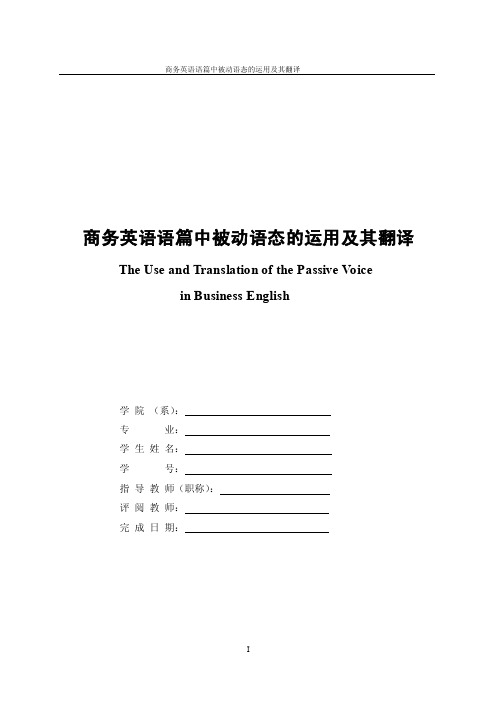
商务英语语篇中被动语态的运用及其翻译The Use and Translation of the Passive Voicein Business English学院(系):专业:学生姓名:学号:指导教师(职称):评阅教师:完成日期:I商务英语语篇中被动语态的运用及其翻译[摘要]被动语态是语言学中较为常见的语法现象。
较汉语而言,英文中使用得更为广泛,尤其是在商务英语这一实用性语体中更是有着举足轻重的地位。
本文共分四章对此课题进行研究,首先对英汉语篇中被动语态做对比分析;接着进一步探究了商务英语中被动语态的分类、功能及运用,商务英语中被动语态的大量使用实现了正式、公正、礼貌、委婉等语用功能,是合作原则与礼貌原则的体现;然后具体介绍了商务英语中被动语态的翻译,由于汉语中较少使用被动语态,因此翻译上应注重功能对等,在措辞上遵循汉语表达的同等语用功能;最后做出总结。
[关键词]商务英语;被动语态;运用;翻译IIThe Use and Translation of the Passive Voicein Business EnglishEnglish MajorAbstract: The passive voice is a common grammatical phenomenon in linguistics. Compared with the Chinese, it is used more widely in English, and it also has a pivotal position in the practical Business English language. This paper is divided into four chapters to discuss this subject. At first,we do comparative analysis of the passive voice in Chinese and English; And then further explore the classification, function and use of passive voice in English. The extensive use of passive voice has achieved formal, impartial, courteous, tactful and other pragmatic functions, which also shows the principle of cooperation and courtesy; then it specifically introduces the translation of passive voice in English. Because the passive voice is less used in Chinese, we should focus on the functional equivalence of translation that is, trying to make the Chinese wording have the same pragmatic function; At last we have a summary.Key words: Business English; passive voice; use; translation strategiesIIIContentsIntroduction (V)Chapter 1 The Comparison of Passive V oice in English and Chinese (2)1.1 The forms of passive voice (2)1.1.1 The form of passive voice in English (2)1.1.2 The form of passive voice in Chinese (2)1.2 The features of passive voice (3)1.2.1 Format (3)1.2.2 The relationship of subject and object (5)1.2.3 The mobility (5)1.3 The factors of using passive voice (5)Chapter 2 Passive V oice in Business English (6)2.1 Classification (6)2.2 Pragmatic function (6)Chapter 3 The Translation Strategies of the Passive Voice in B usiness English (9)3.1 Using passive forms (10)3.2 Using active forms (10)Conclusion (12)References (14)Acknowledgements (XIX)IVIntroductionInternational business activities are increasing in today‟s economic globalization. The English used in the introduction of technology, foreign trade, investment, foreign contracting and labor service contracts, international finance, foreign insurance, overseas investment and other fields are all called Business English. Business communication is the bridge for people to explain views and achieve cooperation, which is inseparable from the speech activities. English as a universal language in the world plays an important role in business verbal communication. Business English is a branch of the English language system, which serves for the specific international business activities. It is based on English vocabulary, basic grammar and sentence structure, but it has a unique language phenomenon and content. From the stylistic features of Business English, we can easily find there are lots of passive sentences, which are not commonly used in Chinese, so we have encountered problems in the translation. It is necessary for us to have a comparison of the differences between English and Chinese. Exploring the use of passive voice in business English discourse and its translation is good for a translator to grasp the original style, make a rational wording and protect the speakers‟interests as well as manifest their courtesy and cooperation.VChapter 1 The Comparison of Passive V oice in English and Chinese1.1 The forms of passive voicePassive voice is a common grammatical phenomenon in English which is opposed to the active voice. It composed of different tense of “to be” followed by a verb‟s past participle form and the subject is the bearer of the action. Passive voice can avoid giving others the subjective feeling, so that the text is more objective and formal and the tone will be more tactful. “English passive voice has a variety of forms, and there are strict rules for the structure and syntax. While in Chinese only one word or phrase in the passive form can show the passive voice.”(何自然,1988:42) [1]1.1.1 The form of passive voice in EnglishA. The passive voiceThe passive voice is the most common form to manifest the English passive meaning, in general, it is composed of “be + past participle”or “get / become + past participle”.The passive voice composed of “g et / become + past participle” generally refers to the result of the action rather than the action itself.It often expresses the meaning that something is finally done, something takes place suddenly or someone has a chance encounter. It can also show the “gra dation” of the state, emphasis on action process. For example:[e.g. 1] History is made by the people.The more I hear, the more I get / become troubled.B. The active form expressing the passive meaningThere are some verbs with active form in English which actually are expression of passive meaning. For example,[e.g. 2] The man is drowning = The man is being drowned.1.1.2 The form of passive voice in ChineseUnlike English passive sentence,the Chinese passive sentence doesn‟t change the form. The difference between passive sentence and active sentence lies in the “mark words of the form”. If you don‟t take the semantic level into account, there is no different sign between the form of passive sentences and the general structure of the active sentences. Therefore, the Chinese passive sentence can be also divided into two categories: passive sentence with theVInegative mark and the active form expressing passive meaning. This presentation will help us to compare it in English and Chinese. Chinese passive sentence is verb-predicate sentence and its adverbial is preposition phrase composed of “被”. The subject is the bearer of the verb, and the object is the executer. For example, “敌人被我们消灭了。
英语被动语态的语用分析及其翻译
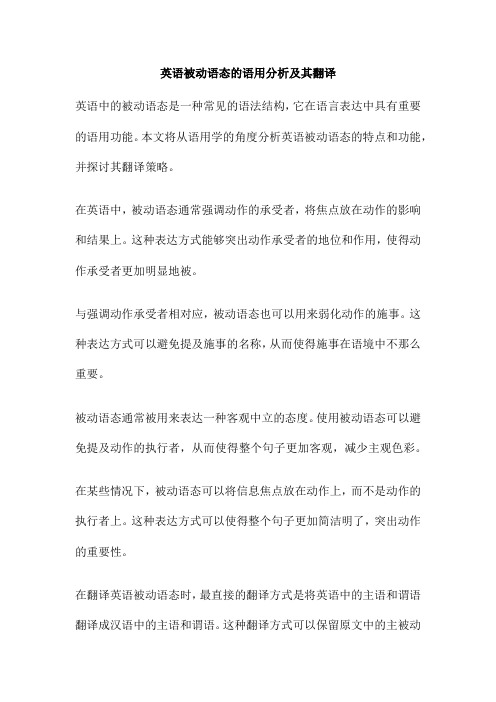
英语被动语态的语用分析及其翻译英语中的被动语态是一种常见的语法结构,它在语言表达中具有重要的语用功能。
本文将从语用学的角度分析英语被动语态的特点和功能,并探讨其翻译策略。
在英语中,被动语态通常强调动作的承受者,将焦点放在动作的影响和结果上。
这种表达方式能够突出动作承受者的地位和作用,使得动作承受者更加明显地被。
与强调动作承受者相对应,被动语态也可以用来弱化动作的施事。
这种表达方式可以避免提及施事的名称,从而使得施事在语境中不那么重要。
被动语态通常被用来表达一种客观中立的态度。
使用被动语态可以避免提及动作的执行者,从而使得整个句子更加客观,减少主观色彩。
在某些情况下,被动语态可以将信息焦点放在动作上,而不是动作的执行者上。
这种表达方式可以使得整个句子更加简洁明了,突出动作的重要性。
在翻译英语被动语态时,最直接的翻译方式是将英语中的主语和谓语翻译成汉语中的主语和谓语。
这种翻译方式可以保留原文中的主被动关系,同时也可以保留原文中的信息焦点。
在翻译英语被动语态时,有时候需要将英语中的主语和谓语进行转换。
这种翻译方式主要是为了适应汉语表达习惯,使得译文更加符合汉语的语言规范。
当英语被动语态中的动作承受者无法在汉语中找到对应的主语时,可以采用意译翻译的方式。
这种翻译方式将英语被动语态中的动作承受者翻译成汉语中的动词短语或者介词短语等成分,从而使得译文更加符合汉语的语言规范。
在英语被动语态中,有时候会省略施事或者使用虚词来表示施事的存在。
在这种情况下,可以采用省略翻译的方式,直接将施事省略不译,从而使得译文更加简洁明了。
英语被动语态的语用分析和翻译需要结合具体的语境来进行。
通过深入理解英语被动语态的语用功能和翻译策略,我们能够更好地把握被动语态在语言表达中的作用和意义,从而更好地进行跨语言交流和翻译工作。
在英语中,被动语态的使用是常见的语法现象,尤其在商务信函和合同中。
被动语态的使用能够强调动作的接受者,使文本更加客观、正式,并提高文本的可信度和规范性。
商务翻译被动语态讲解 PPT
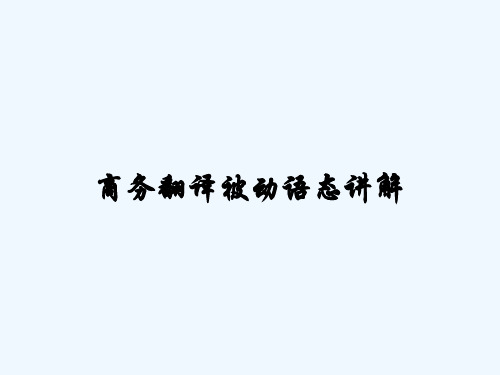
人们相信,越来越多得中国人将离开城市搬到郊区去住。
It is hoped that you will be back after you plete your Ph、 D、 in the USA、
被动句式(1):译成汉语得主动式 ① 保留原文中得主语
On their domestic stations, the trade issues were dismissed briefly、 在他们国内电台得广播中,贸易问题只是轻描淡
写地报导了一下。
The president was offered some support from his board of directors、 总经理得到了董事会得一些支持。
众口相传,有关合并得消息不胫而走。 Visitors are requested to e by appointment、 来访者请提前预约。 On such a basis has the question of restructuring the pany been raised、
公司重组得问题就是在这样得基础上提出来得。
their lives in that tedious but unavoidable process known as waiting、 据估计,美国人一生中在乏味却又无法躲避得等待上所花得 时间竟达五年之多。
被动句式(1):译成汉语得主动式 ⑧ 以it为形式主语得被动句得翻译
有些以it为形式主语得英语被动式句子,在翻译成汉语得 时候常要改变成主动形式。译文有时不用加主语,有时则需 要加入一些不确定得主语,比如:“大家、有人、人们、我们” 等,或者将其处理成独立句。例如:
商务英语翻译4被动语态,从句,长难句
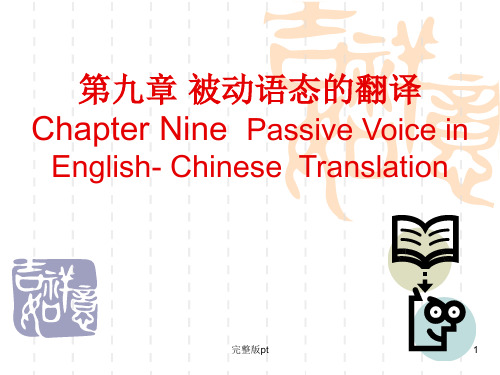
完整版pt
7
1.英语的被动句译成汉语的主动句
将英语的被动句译成汉语的主动句主要有四
种方法:
1.1. 原文中的主语在译文中仍作主语,但 不表示被动意义。
▪ Language is shaped by, and shapes, human thought.
语言由人的思想形成,并影响人的思想。
▪ Levi’s jeans were first introduced to(引进到)
the East, apparently, during the dude-ranch craze(农场度假热潮) in the 1930s.
李维的牛仔裤最初引进到东部显然是在20世纪
第九章 被动语态的翻译 Chapter Nine Passive Voice in
English- Chinese Translation
完整版pt
1
英语的一个显著特点是广泛使用被动 语态,在科技文章中尤为如此。
以下面一段英语文章为例,在14个谓语动词
中,13个使用的是被动语态。
As oil is found deep in the ground, its presence
oil, a “drilling rig(钻塔)” is assembled(装配). The
most obvious part of a drilling rig is called “a derrick
(油井的铁架塔)”. It is used to lift sections of
pipe,
完整版pt
The song was composed by a worker.
英语商务信函中被动语态的语用意义及其翻译
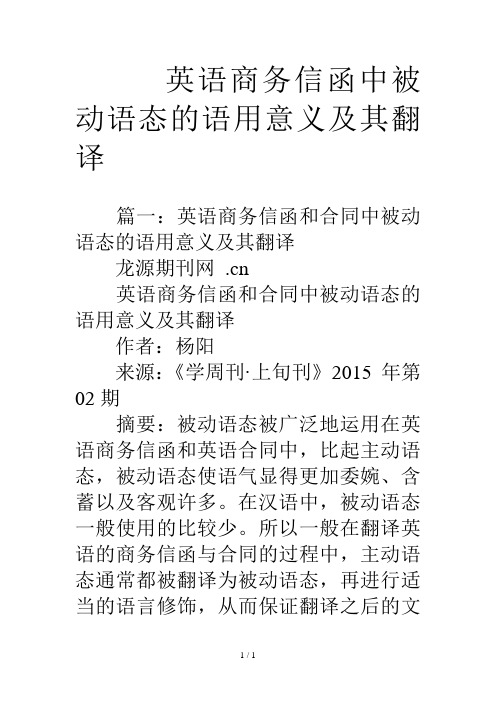
英语商务信函中被动语态的语用意义及其翻译篇一:英语商务信函和合同中被动语态的语用意义及其翻译龙源期刊网.cn英语商务信函和合同中被动语态的语用意义及其翻译作者:杨阳来源:《学周刊·上旬刊》2015年第02期摘要:被动语态被广泛地运用在英语商务信函和英语合同中,比起主动语态,被动语态使语气显得更加委婉、含蓄以及客观许多。
在汉语中,被动语态一般使用的比较少。
所以一般在翻译英语的商务信函与合同的过程中,主动语态通常都被翻译为被动语态,再进行适当的语言修饰,从而保证翻译之后的文章流畅通顺。
关键词:英语商务信函被动语态作为商务英语中比较常见的一种语法现象,有助于体现合作的礼貌与原则。
而商务英语中,被动语态的使用和汉语的被动语态的用法有着一定程度上的不同。
本文主要就针对商务英语中被动语态使用较多的商务信函与合同进行分析,从而更好地理解被动语态在商务英语中的应用与翻译状况。
一、对被动语态的认识被动语态作为动词的一种形式存在,主要是指主语是谓语动作的承受者。
若是要讲述一个客观事实就需要借助被动语态。
被动语态强调的是动作的承受者,而不是动作的发出者。
被动语态通常都是由by引导出来的,但是也有由介词by引导出来的短语,如“by bike”(骑自行车)“by bus”(坐公共汽车)等。
并且还有一些真被动、假主动的十几个常用词的用法都需要我们注意,如“so heavy to carry”表示的就是被动语态,但却不是用的“so heavy to be carried”。
针对被动语态使用的不同情况,我们一定要做到全面掌握每一种被动语态,这对于学习英语及商务信函和合同的翻译都是十分重要的。
二、英语商务信函和合同中被动语态的语用意义及其翻译(一)英语商务信函中被动语态的语用意义及其翻译被动语态作为一种重要的语言手段与工具被广泛运用在商务英语中。
与主动语态相比,被动语态不强调动作的发出者,这样在语气上就会显得委婉许多,也不会让动作的承受者感受到一种发出者将某种意思强加的强硬感觉。
(9)商务英语被动语态翻译

• 二、 商务英语被动句式的翻译
• 被动句在翻译成汉语时,往往要处理成符合汉语 习惯的主动句,但少数仍旧保持被动语态,一般 的翻译方法有三种: • ①译成汉语的主动式; • ②译成汉语的被动式; • ③译成汉语的特殊结构。
• 1.译成汉语的主动式
• (1)保留原文的主语:将原文的主语仍旧译成汉 语的主语。
Байду номын сангаас
• 他们对另一个航班正在装运的所有行李进行了 安全检查,发现没有一个乘客的名字能和那个 行李箱对上。
• Ex.
• Trade relationship has been established between China and most other countries in the world. • 中国与世界上大多数国家建立了贸易关系。
Marketing is seen as the task of finding and stimulating buyers for the firm’s output.
• 人们认为营销就是为某个公司的产品寻找买 主,并鼓励购买。
Public relations (PR) is a term that is widely misunderstood and misused to describe anything from selling to hosting, when in fact it is a very specific communication process. • 人们普遍对公共关系这个词存在误解,错误地用它 来描述从销售到招待客人等无所不包的各种活动, 而实际上,它是一个非常专门的交流过程。
• • • • • • • • • • • It is said that 据说 It is hoped that 希望 It is reported that 据报道 It is supposed that 根据推测说 It must be admitted that 必须承认 It must be pointed out that 必须指出 It will be seen that 由此可以看出 It is well known that 大家知道 It is generally considered that 大家认为 It is believed that 人们相信 It is asserted that 有人主张
商务英语被动句的翻译
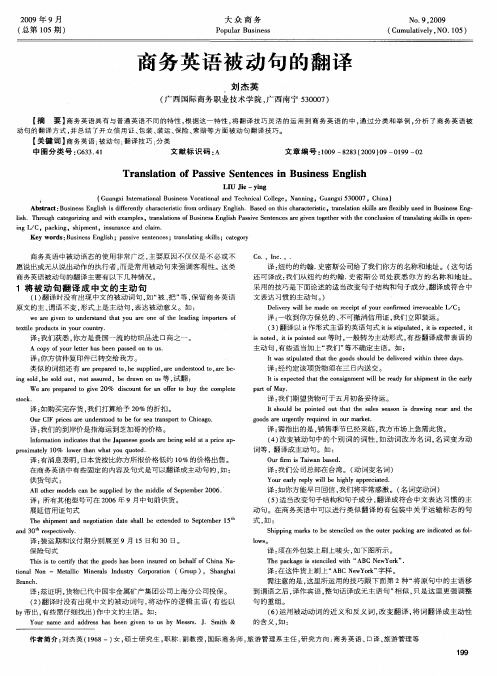
De ie l b d n r c i t o o rc n r e re o a l /C; l r wi e ma e o e ep fy u o fm d ir v c b e L vy l i
译: 装运 期和议付 期分别展 至 9月 1 5日和 3 O目。 保 险 旬 式
T i st e iy t a h o dsh s b e n u e n b h l o i a Na h si o c r f h t e g o a e n i s r d o e a f f Ch n — t t
【 摘 要 】 商务英语具有与普通英语不同的特性 , 根据这~特性, 将翻译技巧灵活的运用到商务英语的中, 通过分类和举例, 分析了商务英语被
动句 的翻译方式 , 总结 了开立信用证 、 装 、 并 包 装运 、 险 、 赔 等 方 面 被 动 句 翻 译 技 巧 。 保 索
【 关键词 】 商务英语; 被动句; 翻译技巧; 分类
译: 需指 出的是 , 售季节 已经 来临 , 销 我方 市场上急需 此货。 () 4 改变被动 句中 的个别 词 的词 性 , 动 词 改为 名词 , 如 名词 变 为动
词等 ,翻译成 主动句 。如 :
0u r sTa wa a e . rf i m i i n b sd
20 0 9年 9月 ( 第 15期 ) 总 0
大 众 商 务
Po ulr Busn s p a ie s
No 9, 0 9 . 20
商务英语翻译8.2 被动语态翻译-文档资料

5. 译成汉语判断句
有些英语被动句并不突出强调被动动作,而着重对 事物的状态、过程和性质等加以描述,其作用与系 表结构类似。因此,翻译这种英语被动句,经常采 用“是……的”判断句式。
1. Our price has already been closely calculated. 我方价格是经过精密核算的。
2. 保留原主语, 译成主动句
1.The first partial goods will be shipped on the first available steamer at the beginning of June. 第一批货物将于6月初装在第一艘订到的船上。 2. An agreement was never reached for the simple reason that neither side wants to give in. 协议没有达成的原因很简单,那就是双方都不 让步。
1.This conclusion is hardly justified by the results. 这些结果很难证明这个结论是正确的。
3. 把原文中的主语译为宾语
2. This contract was made by and between the buyer and the seller in Hangzhou last summer. 去年夏天买卖双方于杭州签订了本合同。 3. She was rejected as she violated the rules of the company. 公司开除了她,是因为她违反了公司的规定。
5. 译成汉语判断句
2. The plan for the next five years is made by the managers.
自学考试商务英语本科 第9单元 被动语态的翻译

本文摘自学培网
常用句型:
It has been viewed that 有人指出…… It is asserted that 有人主张…… It is noted that 人们注意到…… It is sometimes asked that 人们有时会问…… It is understood that 人们知道…… It has been illustrated that 据说明/图示…… It is found that 人们发现/据发现…… It must be admitted that 必须承认…… It will be seen from this that 由此可见……
本文摘自学培网
3.翻译为当然被动句
在现代汉语中,有些句式看似主动,实际上 却表示被动的含义,只是没有用“被”字, 这种句子称为“当然被动句”。 Public servants have ranks according to their job categories, and their base salaries are decided accordingly. 公务员均是按照各自职务来享有职级的,其 基本工资也是按照职级来确定的。
本文摘自学培网
6.补充主语,译为主动句
如果英语原文中并未指出动作的施 动者,汉语译文可以根据上下文, 把意会的行为主体作为主语,将英 语的被动句译为汉语的主动句。增 加的主语多为“人们”、“有人”、 “大家”等。
本文摘自学培网
本文摘自学培网
例3:
Four major stages in the product life cycle have been identified: introduction, growth, maturity and decline. 已经确认,产品的生命周期可以划分为 四个主要阶段:引进市场阶段、成长阶 段、成熟阶段和衰退阶段。
商务英语翻译8.2 被动语态的翻译

3. It may be said without fear of exaggeration that the newly-devised microcomputer can act as a guide to a blind person. 可以毫不夸张地说这种新设计的微型计算 机能够充任盲人的向导。
翻译练习
一、把下列句子译成汉语。 1. One of our principles is to see to it that contracts are honored and commercial integrity maintained. 2. We hope that this dispute can be settled through friendly negotiation without its being submitted for arbitration. 3. If the wrong goods were not delivered, we might have used this lot of goods to complete several orders. 4. Marketing is seen as the task of finding and stimulating buyers for the firm’s output. 5. The shipping quality and weight shall be regarded as final and binding upon both parties.
1. Efforts should be made to promote the economic development. 应努力促进经济发展。 2. Two days are given to her for repairing this car. 给了她两天时间来修这辆车。 3. She ate less and less in the evening so that her weight may be decreased. 她晚上吃的越来越少,为的是减肥。
商务英语翻译8.2 被动语态的翻译

5. 译成汉语判断句
有些英语被动句并不突出强调被动动作,而着重对 事物的状态、过程和性质等加以描述,其作用与系 表结构类似。因此,翻译这种英语被动句,经常采 用“是……的”判断句式。
1. Our price has already been closely calculated. 我方价格是经过精密核算的。
6. 常用被动句型的习惯译法
在英语常用被动句型“It+被动语态+that”中,it 是形式主语,that引导出的是主语从句。 汉语译文习惯上采用主动语态,有时还需要增译 出泛指性的主语,有时也可译成无主句并酌情加 上“根据”或“据”。
6. 常用被动句型的习惯译法
1. It must be pointed out that only if quality is improved can more outlets for export be found and expects be increased. 必须指出的是,质量好了,才能打开出口渠道并扩 大出口。 2. It is generally agreed that organizations that with effective manages will likely be successful, whereas organizations with poor managers will likely fail. 人们普遍认为,拥有高效胜任的管理人员,公司成 功的可能性更大,而管理人员能力低下的公司则大 多会失败。
4.增加主语
有些英语被动句并未在句中出现表示行为主体的 词或词组,在翻译这类句子时,可适当增添一些 不确定的主语,如,“人们”、“有人”、“大 家”、“我们”等。
- 1、下载文档前请自行甄别文档内容的完整性,平台不提供额外的编辑、内容补充、找答案等附加服务。
- 2、"仅部分预览"的文档,不可在线预览部分如存在完整性等问题,可反馈申请退款(可完整预览的文档不适用该条件!)。
- 3、如文档侵犯您的权益,请联系客服反馈,我们会尽快为您处理(人工客服工作时间:9:00-18:30)。
• 2. 译成汉语的被动式:其结构是“受事者-动词”。汉语 中表达被动的一些词或结构:遭受﹑遭到﹑受到﹑得到 ﹑受﹑挨﹑叫﹑被…… ﹑给…… ﹑为……所等等。 Political contests remind us that the candidates are marketed as well as soap; students recruitment by colleges reminds us that higher education is marketed; and fund raising reminds us that “causes” are marketed. 政治竞争让我们看到候选人也像肥皂一样被宣传推销;大 学录取学生使我们明白高等教育也要宣传推销;集资活动 也让我们了解到“各种事业”同样也需要宣传推销。
• Ex.
This conclusion is hardly justified by the results.
• 这些结果很难证明这个结论是正确的。
• (5). 译成无主句:英语被动句有时因某种原因不体现 施事者,但句子又不能没有主语,于是用受事者作主 语。翻译时往往把原文中的“受事者+动词”的顺序 颠倒过来,变成“动词+受事者”,将原文处理成汉 语的无主句,改被动为主动。 • Four major stages in the product life cycle have been identified: introduction, growth, maturity and decline. • 已经确认,产品的生命周期可以划分为四个主要阶段: 引进市场阶段,成长阶段,成熟阶段和衰退阶段。
It is only more recently that it has became increasingly understood that the production of goods is a waste of resources unless those goods can be sold at a fair price within a reasonable time span. 只是在近些年来人们才越来越清楚地认识到,制造出 的产品如果不能在一定的时间内以公平的价格卖出的 话,就是一种资源的浪费。
Developed to meet the needs of output networks, this new socket is characterized first of all by its exceptional performance. 这种新型的插座是为了满足信息输出网络的需要而 开发的产品,它首要的特点是性能卓越。
• Ex. • At the end of the month he was fired for incompetence. 月底,他因无法胜任工作而被解雇了。
• In the last few months the region was hit by the severe financial crisis. 过去几个月这个地区遭受了严重的经融危机。
• (4).把施事者译成主语
As most countries are vigorously promoting exports and also because of the tremendous growth of multinational corporations, the international market, in most instances, is characterized by intense competition on an extensive scale. • 由于大多数国家都在积极地促进出口而且跨国 公司是在以惊人的速度增长,国际市场多以大规模 的激烈竞争为特点。
第九单元
被动语态句的翻译
一、 英语被动语态句
• 英语被动语态的构成形式: 主语(受事)+be+过去分词 • 其变体形式为: 主语(受事)+get/become+过去分词 • 英语中只要主语是受事,谓语动词就要使用被动语态 的形式。
二、 商务英语被动句式的翻译
Translation of Business English e
• 二、 商务英语被动句式的翻译
• 被动句在翻译成汉语时,往往要处理成符合汉语 习惯的主动句,但少数仍旧保持被动语态,一般 的翻译方法有三种: • ①译成汉语的主动式; • ②译成汉语的被动式; • ③译成汉语的特殊结构。
• 1.译成汉语的主动式
• (1)保留原文的主语:将原文的主语仍旧译成汉 语的主语。
Ex.
1. The output of tractors has been increased greatly. • 拖拉机的产量有了很大的提高。 2. Problems should be resolved in good time.
• 有问题要及时加以解决。
• (2). 将原文中的主语译成宾语,增译主语:如果原 句没有施动者,可以在译文中加上相应的主语,如: “人们,有人,大家,我们,众人”等含有泛指性 的词语作主语。
• 会计系统提供的金融信息对于帮助经理制定计划和控制 该经济实体的活动而言是不可或缺的。
Ex.
• The decision of acquisition and merger is not taken lightly by the management. 并购的决定不是管理层轻易做出的。
• (7). 以it为形式主语的英语被动句,在翻译成汉语的时 候往往使用主动形式。译文有时不加主语,有时加入一 些不确定性的词(如大家﹑有人﹑人们﹑我们等)作主 语,或者将其处理成独立句。
•
Ex.
1. An MBA degree is considered to be one of the important requirements for the corporate position. 人们认为工商管理硕士学历是担任这一公司职位的必要 条件之一。
2. With the development of modern electrical engineering,
Marketing is seen as the task of finding and stimulating buyers for the firm’s output.
• 人们认为营销就是为某个公司的产品寻找买 主,并鼓励购买。
Public relations (PR) is a term that is widely misunderstood and misused to describe anything from selling to hosting, when in fact it is a very specific communication process. • 人们普遍对公共关系这个词存在误解,错误地用它 来描述从销售到招待客人等无所不包的各种活动, 而实际上,它是一个非常专门的交流过程。
• • • • • • • • • • • It is said that 据说 It is hoped that 希望 It is reported that 据报道 It is supposed that 根据推测说 It must be admitted that 必须承认 It must be pointed out that 必须指出 It will be seen that 由此可以看出 It is well known that 大家知道 It is generally considered that 大家认为 It is believed that 人们相信 It is asserted that 有人主张
It is generally agreed that organizations with effective managers will likely be successful, whereas organizations with poor managers will likely fail. • 人们普遍认为,拥有高效胜任的管理人员,公司 成功的可能性更大,而管理人员能力低下的公司 则大多会失败。
Ex.
It is believed that more and more people in China will be moving out of the country to live in the city. 人们相信,越来越多的中国人将离开农村搬到城市 去住。
关于it的一些固定词组的翻译
• 他们对另一个航班正在装运的所有行李进行了 安全检查,发现没有一个乘客的名字能和那个 行李箱对上。
• Ex.
• Trade relationship has been established between China and most other countries in the world. • 中国与世界上大多数国家建立了贸易关系。
The passive voice is more commonly used in English than in Chinese, especially in the writings of science and technology. In the sentences in which the doers are not necessarily told or not known, the passive voice is often used. And sometimes for the sake of connection of the context, there occurs the passive voice. Since the passive structure seldom appears in Chinese, many passive sentences in English have to be turned into Chinese active sentences as many as possible. But the version must be made idiomatic and smooth, not ambiguous or abstruse (hard to understand). This is a problem which is worth our attention.
